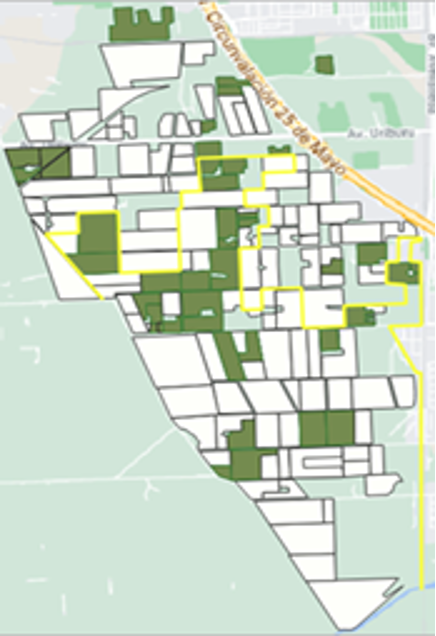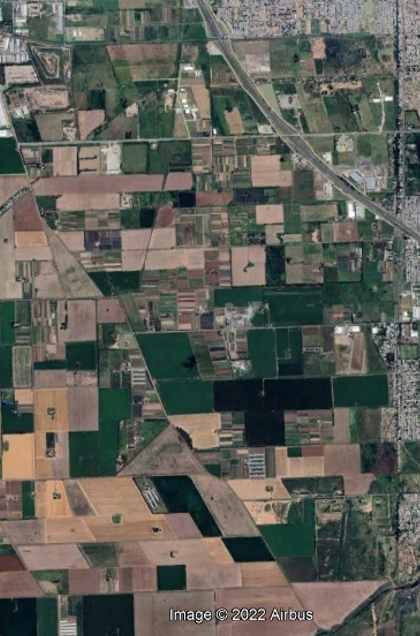One of the biggest problems to be faced is the pressure of a speculative real estate market on rural land, in order to re-classify it for development (industrial or residential). This pressure takes place despite the fact that there is no real need for expansion, nor are there possibilities to provide the land with the necessary infrastructure for its urbanisation.
As has been mentioned, the surface area dedicated to horticulture in the rural areas of the city of Rosario has been decreasing notably and progressively since the 1970s. Urban growth and pressure for the use of land for other economic activities in the peri-urban areas have been the causes of this reduction in and around the city of Rosario.
Although 800 Ha of rural land in the Municipality has been protected for fruit and vegetable production by regulation (Ord.10.139/20), it is under permanent threat from real estate pressure and changes in land use. This situation constitutes a significant risk given that, as mentioned above, the reduction or disappearance of this productive area would imply the loss of environmental services that are indispensable for the city and its population, including the supply of fresh food.
The first horticultural census of the Rosario Metropolitan Area, carried out by INTA and the Faculty of Agricultural Sciences of the UNR in 1985, indicated that the area dedicated to horticulture was 9,495 Ha and, in the year 2022, for the same productive area, it was 2,990 Ha. This 69% reduction is the result, on the one hand, of the agro-industrial model that has led to a process of intensification of cereal and oilseed crops for export, which has replaced the area dedicated to the production of fresh food with commodities (mainly soya, but also transgenic maize, wheat, sunflower and sorghum). And, on the other hand, the advance of the urban frontier over peri-urban rural areas in the central city, but especially over rural areas in the localities closest to it, which receive a large number of people looking for residential land at more affordable costs than those of the central city. The increasing reclassification of productive land as industrial, both in urban and peri-urban areas, has generated a significant decline.
The difficulties for peri-urban producers -conventional, agro-ecological transition and agro-ecological- to access land with secure tenure are significant. 70% of peri-urban producers lease land on a leasehold basis. Seventy per cent of producers lease land, mostly on a precarious basis (informal lease contracts). This difficulty is accentuated for small family producers in peri-urban areas and, even more so, for those who wish to enter agro-ecological production.
A high percentage of horticultural land has been converted to commodity production under the logic of a production model that has been called into question due to the unsustainability of its approach and the consequent degradation of natural resources (water, soil, air, flora and fauna). Under this logic, the high use of agrochemicals in peri-urban areas, both in intensive and extensive conventional crops, is a serious problem. The lack of technical advice, the weakness in the use of agronomic recipes and in the application of Good Agricultural Practices (GAP) accentuate this problem. As a result, soils are degraded, not only by the indiscriminate use of agrochemicals and machinery, but also by the intensification of production to which they are subjected. These modalities, characteristic of industrialised agriculture, progressively threaten the biological activity of soils, impoverishing their conditions as a support for agriculture. The lack of control of the practices developed means that the products, in general, do not have basic conditions of safety and traceability, which constitutes a high risk to the health of the population that consumes them and of the farmers who produce them.
Contamination from the massive use of agrochemicals in the production process has been detected in fresh foodstuffs, particularly vegetables, both in products from the region and those coming from other production areas of the country. In 2017, a study was carried out in Rosario on pesticide residues in vegetables, based on the initiative of an environmental lawyer, Augusto Zarate, who subjected randomly selected vegetables from two greengrocers in the city to laboratory analysis. Eleven types of agrochemical residues were detected in 75 per cent of the samples (Clarin Rural, 23/01/2020).
Although there is an effort to disseminate Good Agricultural Practices (GAP)s by different institutions, they are not adopted as they should be, and even so, it is considered that they are not enough to have access to healthy food. In any case, conventional producers are being assisted to produce in a more sustainable way. In the last horticultural census 2022 carried out by INTA Oliveros and the Faculty of Agricultural Sciences UNR, it is indicated, according to the surveys, that the adoption of GAP is null.
A problem that is difficult to solve is the change in the profile of peri-urban producers, which threatens not only the sustainability of the activity, but also the protection of their own knowledge. It should be added that peri-urban horticulture is a task traditionally handed down from father to son. Most of the rural workers in the peri-urban area of Rosario are third generation producers, and are currently over 70 years old (2022). This dynamic has changed due to the fact that their children do not continue with the activity. In the face of this, most of the producers who are owners lease their farms to landless producers through informal contracts. And, in some cases, if it is possible to sell them as future land for development, they prefer this alternative. The growing insecurity in the city also plagues these farms, many of which are frequently vandalised or robbed. This problem is another reason for the sale of establishments and the pressure to change land use.
A difficulty that is linked to the previous ones, making the sustainability of the activity more complex, is the high level of informality in the contracting of labour, with the prevalence of non-formal work for rural workers. The country's worrying economic and social situation has a strong impact on producers in the green belt and urban agriculture, who carry out their work in a context of great vulnerability, accentuated by the energy crisis and climate change, the consequences of which are detrimental to productivity, entailing substantial losses.
The lack of basic infrastructure makes it difficult to put rural plots into production. Likewise, rural housing conditions for smallholder families living on horticultural farms are deficient. These deficiencies especially affect migrant families from the interior of the country and from neighbouring countries, in search of better living conditions, who dedicate themselves to vegetable production in the city of Rosario, mainly in the Food Protection and Promotion Area.
Conventional local marketing is carried out through intermediaries organised in two markets for the concentration and sale of fruit and vegetable production. A large part of this production comes from other regions of the country, hundreds of kilometres away from Rosario, which generates high energy costs for transport and conservation, as well as significant losses due to the deterioration of the transported products. Intermediation and concentration imply a high level of speculation that harms producers, especially those who produce under agro-ecological methods that are not recognised or valued in their fair measure. This situation makes it essential to create short marketing chains for products.
For the reasons explained above, the surface area for food production and horticultural producers is seriously threatened in peri-urban areas. The city and the region have lost food autonomy and have become increasingly dependent on fresh food supplies. This problem is exacerbated by the worsening energy crisis. In fact, difficulties in transporting products from distant places when there is a lack of fuel are evident through the shortage and cost of fuel.
Although changes are taking place in the way people with high purchasing power, especially young people, are eating more healthily, the habits of the most vulnerable sectors are based mainly on carbohydrate and fat intake, with the consequent health consequences. Currently, the demand for agro-ecological food is greater than the supply of local products, which represents a problem to be solved by increasing production and access to products.


Horticultural Establishments in the Southwest Periurban Area of Rosario. PCVR survey (2022)